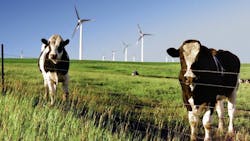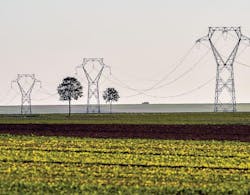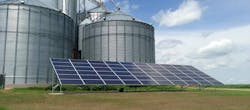Evaluating Renewable Energy Leases and Easement Opportunities
I have received several questions in the past few months, regarding the process of evaluating lease and easement opportunities covering a wide array of opportunities in renewable energy, including wind, solar, or transmission line projects. Understanding and reviewing these agreements is essential for both utility legal teams and landowners. Agreements can be quite lengthy and complex. With talk in the Biden administration of increasing investments in renewable energy, it is a prime time to discuss the key terms found in these agreements and how to evaluate the potential income opportunity they may provide.
In past years, evaluating lease and easement opportunities involving wind energy, crude oil pipelines, and electric transmission lines have been discussed extensively. It is a relatively recent development that utility companies are seeking easements and leases for solar (photovoltaic) projects. Additionally, many electric utilities are updating transmission lines or adding transmission capacity in developing areas, impacting farmland surrounding these areas. In general, these agreements should be evaluated in a similar way and with an eye towards protecting the landowners existing rights and achieving a mutually beneficial relationship between the company and landowner.
Rights to install renewable energy plant
Here is an example of a typical question I receive from landowners regarding these opportunities:
“We recently received a letter stating that, after an initial review of our land, it is suitable for installation of a renewable energy project. We have also been visited by a land agent that has asked us to enter into a long-term leasing agreement. A representative of the company says that the company is interested in the location of our farm because it is next to a powerline that feeds into a larger city. Quite frankly, the offer seems too good to be true. The company is willing to pay US$800 per acre for the right to install these solar panels on at least 20 acres of my farm. It is hard not to consider such an offer since I currently cash rent this ground for US$250 per acre. What questions should I be asking the company representative? When should I share this letter with my attorney? What if the company runs into financial problems, declares bankruptcy, and walks away from these solar installations? It seems to me that they would be dependent on a government subsidy or tax credit to make the project work.”
Many questions arise for landowners approached with leases and easements relating to these renewable energy installations. It is important to remember, that a lease is really just a contract where the party owning land conveys a portion of land to another party to use for a specific time, usually for a specific periodic payment. An easement is a similar concept, but is actually a grant of a right given to another to use land you own. For instance, utility companies generally request easements for utility line installations and will record those agreements. Once those agreements are recorded, they are available to the general public and are of record at the county recorder’s office.
For landowners presented with these opportunities for construction of these projects, though, the biggest question is what rights and legal responsibilities will they assume or give away if they enter into an easement or lease agreement with the company constructing the facility. As with any document affecting property rights, asking the right questions and having the document reviewed by an attorney is key to making a good decision. Landowners may also want to attend public informational meetings to gather information from companies and to better understand the process.
There are some important lead-off questions for landowners to ask, including, but not limited to: What is the term or length of the easement? Will the entire easement be recorded at the County Recorder’s office or just a memorandum of the agreement? Is the agreement assignable? (Can the company assign their rights to another company?) What is the payment and how is it structured? Is there an adjustment for inflation built into the agreement? Am I protected from liability as a landowner, if there is a problem with the installation or a catastrophic event occurs? How will my farming operation be impacted and for how many years?
Access rights
Other questions may involve the land itself and long-term impacts. What access rights, and through what routes, does the company propose? What is the exact location of the installation and will the company share that information ahead of time? Oftentimes, the company will share proposed locations with the landowner, provided that those locations may be subject to change pending county or other project approval.
Some landowners are very concerned about soil impacts due to construction. If the company damages my crops or compacts my soil, what does the agreement provide for compensation for compaction, soil damage and, will my land be returned to its former condition after construction and installation and what is the process for removing and replacing topsoil? What is my burden as a landowner for proving such damage? Another important question might be who hires the work done- the company or the landowner? How long will it take for work to be completed?
Agreements
Other landowners are concerned about how the agreements end or what if the company goes through bankruptcy or government subsidies are no longer available. Is there a bond set aside or required for the removal of the installations at the end of the agreement? What happens if the agreement is assigned to another company?
Finally, in the event of a legal dispute, is there a mandatory arbitration or mediation clause? Do I have to give up my right to a trial by jury? The terms of these agreements can be negotiated and at the very least discussed for clarification.
Whether it is wind projects, transmission line projects, solar projects or other legal agreements involving renewable energy — asking the right questions and consulting with experts and your attorney is key to understanding the rights and responsibilities you may assume by entering into a long-term easement or lease arrangement. On a smaller-scale, landowners are often approached by their county governments with easements or offers to purchase small portions of land for the improvement of highways, bridges, or other infrastructure.
Eminent Domain and Condemnation
What about eminent domain or condemnation if we can’t agree? In Iowa and other states, the power of eminent domain or condemnation may be used to condemn private property for public or private ownership that serves a public purpose or public use. This is sometimes referred to as a “taking” of private property. The terms generate a lot of discussion from a political standpoint, but in a nutshell the power of eminent domain or condemnation is used to accomplish a public project that benefits a public purpose. The use of these powers is usually a rare circumstance that might occur if a utility company, for instance, cannot secure enough voluntary agreement from landowners to ensure completion of the project. For instance, an electric utility may need to file an application for condemnation to upgrade a utility line in an area where there is an increasing population. There are legal standards that govern this process. The Fifth Amendment of the U.S. Constitution and Article 1, Section 19 of the Iowa Constitution expressly prohibits any taking of private property for public use without just compensation. Essentially, the standard is that a taking must be “rationally related to a conceivable public purpose” for the eminent domain or condemnation to be approved.
Agreements can be very beneficial to both landowners and utility companies in achieving the goal of developing renewable energy sources. Asking the right questions and working together is the best way to develop an agreement that is beneficial to all parties.
About the Author
Erin Herbold-Swalwell
Erin Herbold-Swalwell is attorney and principal at Brick Gentry P.C. in West Des Moines, IA. She practices primarily in the areas of agricultural law, estate planning and business succession planning. Prior to joining the private practice of law, Erin was the Staff Attorney at the Iowa State University Center for Agricultural Law and Taxation where she assisted farmers and conducted research, writing, and public speaking in several areas of agricultural law. Erin has also served as chair of the Iowa State Bar Association’s Agricultural Law Section. Raised on a family farm near Mingo, Iowa, Erin continues to be involved with farming and agriculture. Erin enjoys giving back to the community and spending time with her family.


